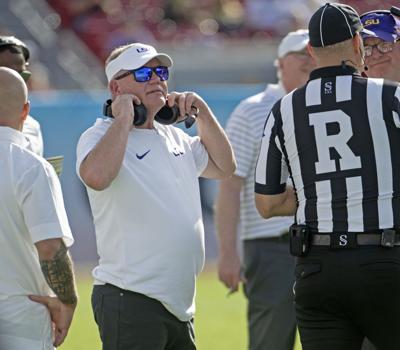In a significant change to LSU's name, image and likeness fundraising efforts, a new subsidiary of the Tiger Athletic Foundation is partnering with the athletic department's NIL collective to help boost its canvassing capabilities.
In a statement released Thursday, TAF billed the partnership as a way to link the two organizations, lumping all of the LSU athletic department's fundraising resources under one umbrella to streamline the process by which the collective can provide NIL compensation to athletes.
It also said the new subsidiary, called TAF Services Corporation, and its agreement with Bayou Traditions, LSU's collective, is the first of its kind. Now, donors can log on to either their TAF account or LSU ticket account and contribute directly to the collective, earning points that make them eligible for gifts.
“This partnership allows Bayou Traditions access to first-class fundraising, events and stewardship services,” TAF president and CEO Matt Borman said in a statement. “LSU student-athletes will benefit greatly from Bayou Traditions’ focus on enhanced NIL opportunities while achieving greater efficiency and fundraising success through resources made available by TAFSC.”
Those who donate can receive membership benefits and TAF priority points, which they were previously ineligible for when giving to Bayou Traditions. TAF noted contributions to the collective are not charitable donations and do not qualify for university naming rights.
The change could help Bayou Traditions improve its operations and marketing presence so it can more easily tap into additional sustainable revenue streams. Then, the amount of cash it has on hand could increase, helping it fund rosters.
This season, the collective budgeted around $8 million for LSU football, The Advocate reported in May. That total is a notch below the $10 million that Jason Belzer, who runs a company that helps operate 62 Division I collectives, estimates the median SEC collective distributes to its affiliate school's football team.
LSU has chosen to award most of those funds to players it recruited from high school and developed inside the program, an approach Brian Kelly once likened to the way the New England Patriots have historically managed their cap space.
In May, the Tigers missed out on a pair of high-profile defensive tackle transfers after their NIL requests ballooned because of a low-supply, high-demand market for players at their position. Kelly then said in an interview with WAFB that LSU isn't interested in "buying players," comments that ignited a swirl of controversy over the Tigers' approach to NIL.
Though revenue sharing is on the horizon in college sports as a result of a settlement in the House v. NCAA antitrust case, NIL collectives may remain intact in the new financial model. Schools are preparing to pay around $20 million to $22 million per year to their athletes beginning in 2025.
Until now, Bayou Traditions' fundraising has suffered at times from a lack of exposure and operational structure. Under the new partnership, TAF's subsidiary will provide fundraising support, marketing initiatives and customer support to the collective.
Wilson Alexander contributed to this report.

